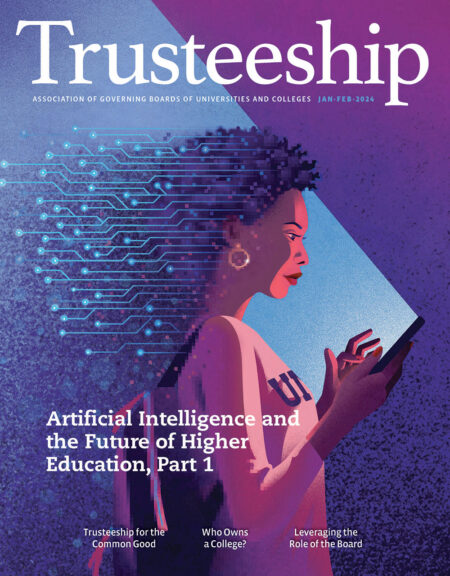
The idea of the New Year’s resolution is a powerful one because it’s an opportunity to shed the past and start fresh. For us in higher education leadership, this is our chance to cast aside our assumptions and reflexive responses to ask a hard question.
Is higher education’s basic governance framework—what we call “citizen trusteeship”—working? Is it robust enough for the transformational challenges currently facing higher education?
A quick refresher: at its core, citizen trusteeship is the idea that a college, university, or foundation governing board composed of independent volunteers with a wide range of backgrounds and experiences, shouldering their fiduciary duties, will govern their organizations better than the government or a select panel of academic experts. Many argue that oversight by layperson volunteers brings diverse perspectives—collective wisdom, if you will—to decisions that will serve the best interests of the organization. Citizen trusteeship enhances credibility, drives innovation, and cleaves academic inquiry to the needs of society. Properly done, it protects academic institutions from powerful untoward influences that have other agendas.
I have spent much of my career supporting citizen trusteeship. Yet reality is so challenging and complex that one could also paraphrase Winston Churchill (who was speaking of democracy) and claim that citizen trusteeship is the worst form of governance except for all the others. Consider these common observations:
- “Board members aren’t higher education experts. How can they lead the institution if they don’t know what they don’t know?”
- “Board members only meet a few times a year, and by the time they learn the ropes, their terms expire.”
- “Fiduciary boards must focus on the best interest of the organization, but those with the purse strings and goals of their own, whether lawmakers, big donors, or other powerful interests, are difficult to resist.”
Furthermore, board service is a job unlike any other. Thoughtful board members constantly wrestle with complex problems that have no certain solution. They must stay away from managing and hold themselves accountable for the institution’s mission fulfillment and long-term sustainability. They must trust and support the chief executive and sometimes ask uncomfortable questions. They must work toward the public good and vigorously defend institutional autonomy. Anyone who takes board service seriously understands that it is anything but a straightforward job. It is becoming more challenging, not less.
So, what can we do to strengthen and demonstrate the benefits of citizen trusteeship? Boards must recognize that they are responsible for two organizations, not one: the organization they govern and the board itself. If the quality of governance does not continuously improve, it will continually decline. Regular annual and comprehensive board assessments can help identify points or areas of confusion that prevent effective decision-making. Boards need educational opportunities, starting with robust orientation and then ongoing professional development. They can embrace AGB’s Principles of Trusteeship, create and uphold codes of conduct, and ensure their focus is on the issues of greatest consequence for mission fulfillment and long-term sustainability.
The other good news is that governing board members aren’t alone. They work alongside expert institutional leaders to tackle wicked problems regularly, occasionally imperfectly, and together try to guide their organizations toward sustainable success. Boards that invite opinions from inside and outside the boardroom enjoy more information, and inspiration, than those that limit their interactions to a few. That doesn’t mean that governing boards should accede to each request and recommendation, but it does mean they should be aware of external perspectives.
AGB is a dedicated ally to boards and citizen trustees. The association was created by an eager collection of board members who simply wanted to do better for their institutions. More than 100 years later, their initiative and fellowship have transformed into a deeply experienced, supportive set of colleagues, resources, services, and guidance for higher education governing boards, walking with them every step of the way.
Each university, college, or foundation needs insightful board engagement. It needs curious, courageous, and committed board members who fulfill their roles alongside administrative leaders, faculty, and others. It needs board members who recognize that board service requires integrity and deep self-reflection. Starting this new year, let’s take nothing for granted, see how we can improve, and get to work.
Ellen-Earle Chaffee, PhD, is the interim president and CEO of the Association of Governing Boards of Universities and Colleges (AGB).
RELATED RESOURCES

Reports and Statements
Consequential Board Governance in Public Higher Education Systems

